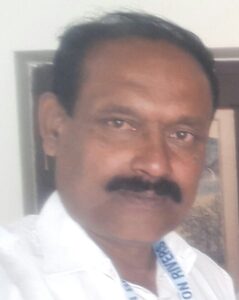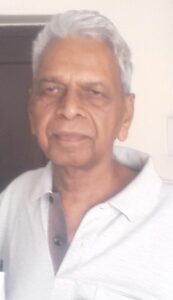
Interview of the Week
 By Prakash Patil*
By Prakash Patil*

T. Vijayendra, 78, was born in Mysore and is a self proclaimed leftist. He grew up in Indore and secured a Bachelor of Technology degree in Electronics from the prestigious Indian Institute of Technology, Kharagpur (IIT Kharagpur) in 1966. After a year’s stint at the Saha Institute of Nuclear Physics, Kolkata, he got drawn into the whirlwind times of the late ’60s. Since then, he has always been some kind of political-social activist. Recently his booklet Kabira Khada Bazaar Mein: A Call for Local Action in the Wake of Global Emergency, has grabbed much attention. Apart from English, it has got translated into Marathi, Kannada and Bengali as well. In a free wheeling interview with social activist from Maharashtra, Prakash Patil in Hyderabad, Vijayendra talks about his booklet and the perception of Global Emergency. Excerpts:
Prakash Patil: The do you mean by Kabira Khada Hai Bazaar Mein?
T. Vijayendra: The title of my book follows Kabir’s famous couplet: कबीरा खड़ा बाजार में, लिए लुकाठी हाथ, जो घर फूंके आपनौ, चले हमारे साथ। Loosely translated it means Kabir is standing in the market place, with walking stick in his hand. Those who burn the bridges, come with us.
It is a call to the youth for local action in the wake of Global Emergency. It is a call for action that requires you to give up everything, in fact, burn your bridges, and work full time for this cause. It is a call, not only to reduce your carbon foot print, but also to earn your livelihood exclusively from Green Jobs. We define Green Jobs as those which involve ‘Restoring Ecology through Rebuilding Communities’ on the basis of Equity and Sustainability.’
PP: Can you briefly tell us about your perception of Global Emergency?
TV: The Global Emergency has several aspects – Global Warming, Resource Depletion, Ecological Degradation and Growing Inequality and Social Unrest. Each of these aspects is at a crisis level. They are inter related and reinforce each other and together they have created a Global Emergency. There is a movement in the whole world about it including the recently concluded [Conference of Parties] COP 26 in Glasgow.
PP: What is the root cause of this Global Emergency?
TV: It is the industrial society or capitalism and its use of earth’s resources at an enormous level, particularly the fossil fuels like coal, petroleum and gas. This is causing CO2 emission, causing global warming and which has dire consequences like ecological degradation.
PP: How will it end?
TV: It can end in several ways. If we do nothing and if we let things go on as they are then resource depletion and global warming and people’s anger and movement will collapse capitalism.
PP: What will happen then?
TV: As industrial society collapses we are entering an era of utter chaos. In this crisis the powerful people are cornering as much wealth as they can before a total collapse occurs, thus worsening the problem. The number of billionaires has increased significantly in this decade. The governments are on the side of the rich and the poor have nowhere to go. Hunger, suicide and crimes have increased. In some places mass protests are taking place. The world is in turmoil.
PP: Is recovery possible? How will it take place?
TV: When society collapses we have only two choices – chaos or planned transition to a different future. One scenario is that chaos prevails and large scale destruction occurs and it may take decades to recover. The other and more difficult choice is to plan a transition to the next phase of history. It is extremely difficult but many people in the world are trying.
PP: What is the next phase in history?
TV: The capitalists are talking about the Fourth Industrial Revolution which involves artificial intelligence, cars without drivers, renewable energy and so on. We feel that it will not succeed because there is real resource depletion. In the short term also it is causing more emission, more global warming.
PP: What is the other alternative?
TV: It is a phased transition to a more equitable and sustainable society with rebuilding the community and ecological restoration as the main task.
PP: Who will do it? Isn’t this the government’s job?
TV: Yes it can be best done by a good government responsible to the people and the earth. For example Cuba did it nearly 30 years ago. Many small countries all over the world, particularly with women head of states are making important changes.
PP: How about big countries like the USA, China and India?
TV: They are ruled by big capitalists and are following the Fourth Industrial Revolution path.
PP: Then where are we heading to?
TV: That is exactly the question my booklet addresses. It suggests local action, both in urban and rural areas by dedicated young people to rebuild our society on the basis of equality and sustainability with rebuilding the community and ecological restoration as the goal.
PP: But how will small efforts at the local level be effective?
TV: When capitalism fully collapses there will be enough examples, experience and trained people to bring out the bigger change in the country as a whole. For example Cuba and other small countries are already playing such a role at the world level.
PP: Can you tell us about your personal journey?
TV: My journey is from the struggle for equality in the left movement to struggle for sustainability in the environment movement. My stay at Bhopal in 1985 during the aftermath of the gas tragedy was the turning point. Today my brief for myself is the education of Left wing cadres. I divide my time between the ecologise group of organic farms, Hyderabad and writing. I have published a book dealing with resource depletion, three books of essays, two collections of short stories, a novella, an autobiography and a children’s science fiction on the bicycle. All the publications are Copy Left and are available for free download at SCRIBD on the internet.
*Prakash Patil is a social activist and runs a non profit organisation ‘Gram Prakash Swaraj Bahuuddeshiya Swanstha’ in Sangli Maharashtra





